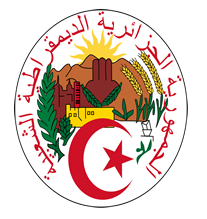Algeria: Government
Key Figures
- Chief of State:
- President Abdelmadjid Tebboune
- Head of Government:
- Prime Minister Sifi Ghrieb
Overview
- Government Name:
- People's Democratic Republic of Algeria
- Constitution:
- Adopted: 1976; This "second" constitution issued by the leader of the Revolutionary Command Council (Houari Boumédienne) emphasizes the importance of socialism and restoring political institutions to their primacy over the military establishment. It was further modified in 1996 to allow the formation of political parties that were not founded on "religious, linguistic, racial, sex corporatist or regional basis."
- Government Type:
- Republic

Index of Economic Freedom
Country Risk Rating
Government Branches
| Main Powers | Election Process | Election Cycle 1 | |
|---|---|---|---|
| Executive | The president is the head of the council of ministers and of the high security council. The prime minister serves as the head of the council of ministers and also head of government in joint with the president. |
The president is elected by absolute majority vote through a two-round system. The prime minister is appointed by the president. |
President: 5 years; Prime Minister: 5 years; National People's Assembly: 5 years; Council of the Nation: 6 years |
| Judicial | The supreme court consists of 150 judges organized into four divisions: civil and commercial; social security and labor; criminal; and administrative. The constitutional council consists of 9 members including the court president. Algeria's judicial system does not include sharia courts. |
Supreme court judges are appointed by the high council of magistracy, an administrative body presided over by the president of the republic, and includes the republic vice-president and several members. The constitutional council has members appointed as follows: 3 by the president of the republic, 4 by the two houses of the parliament, 1 by the supreme court, and 1 by the council of state. |
Supreme Court: no term limit; Constitutional Council: president and members appointed for single 6-year terms with half of the membership renewed every 3 years |
| Legislative | The council of ministers is the chief executive body of the People's Democratic Republic of Algeria. Parliament has relatively less power than the executive branch, and the council of the nation is the upper house while the people's national assembly is the lower. |
The council of ministers is appointed by the prime minister. The council of the nation has 96 members that are indirectly elected by an electoral college and 48 members that are appointed by the president. The national people's assembly has 462 members that are elected through a closed-list proportional representation system. |
National People's Assembly: 5 years; Council of the Nation: 6 years |
Regional Trade Blocs
International Organization Participation [2]
Environmental Agreements [3]
Tax Information [2]
- Tax Authority:
- Information not available
- Tax Name:
- Information not available
Sources:
- ElectionGuide http://www.electionguide.org/
- EY, http://www.ey.com
- CIA World Factbook, https://www.cia.gov/the-world-factbook/
- U.S. Bilateral Relations Fact Sheets http://www.state.gov/r/pa/ei/bgn/


